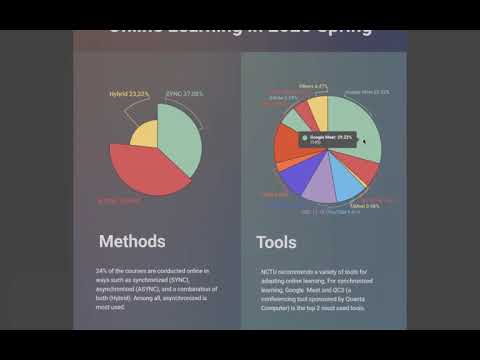Authors: Yu-Lun Huang, Ta-Wei Li
Institution: National Chiao Tung University
Country: Taiwan
Topic: Applications of Open Education Practices/Open Pedagogy/Open Education Research
Sector: Higher Education
UNESCO Area of Focus: Sustainable OER
Session Format: Poster
Abstract
The arrival of COVID-19 had brought great impacts to all aspects, including education. To prevent the virus from spreading, universities in Taiwan started to implement online courses. This may be an effective way to combat coronavirus, but it creates a big challenge for both students and teachers to reach the highest learning effectiveness, as well as several problems like low attendances, limited immediate responses and experiments, and so on.As online courses do not require students to physically appear during class time, some students took this as an advantage to be late or even skipped classes. Even if students showed up on the other side of the monitor, it is still hard for teachers to keep track whether or not they are focusing. Hence, students are likely to miss the key knowledge and result in undesirable grades. Online classes may also be challenging when it comes to submitting and checking assignments or projects. First of all, it is hard to submit physical work, even if they uploaded pictures of their assignments, it will again be a difficult task for teachers to check for the originality of the work and examine them. Due to almost all assignments being turned in online, some students used “bad internet connection” as an excuse for not submitting assignments or submitting it late. In addition, group projects are much harder for both students and teachers. For students, they will not be able to do face-to-face discussions with their classmates to work on the project together. For teachers, organizing group presentations and doing in-class presentations are not easy especially for those who are not used to using technologies for teaching.
In addition, online teaching limits the interactions between teachers and students. For example, when students are watching pre-recorded videos of professors lecturing and come up with a question, they cannot get immediate responses from their professors. Moreover, online courses are not able to provide students the opportunity to be engaged in experiments and laboratories. This diminishes the learning effectiveness of those practical courses. Without hands-on training, they might never really understand how the module or machine works.
NCTU has been promoting OCW for more than one decade and this is a great chance to examine such a teaching style for all teachers. In this research, we intend to investigate the experience of online courses from both teachers and students for future improvements at NCTU.
Keywords
COVID-19, Online Teaching, Experience, Improvements
